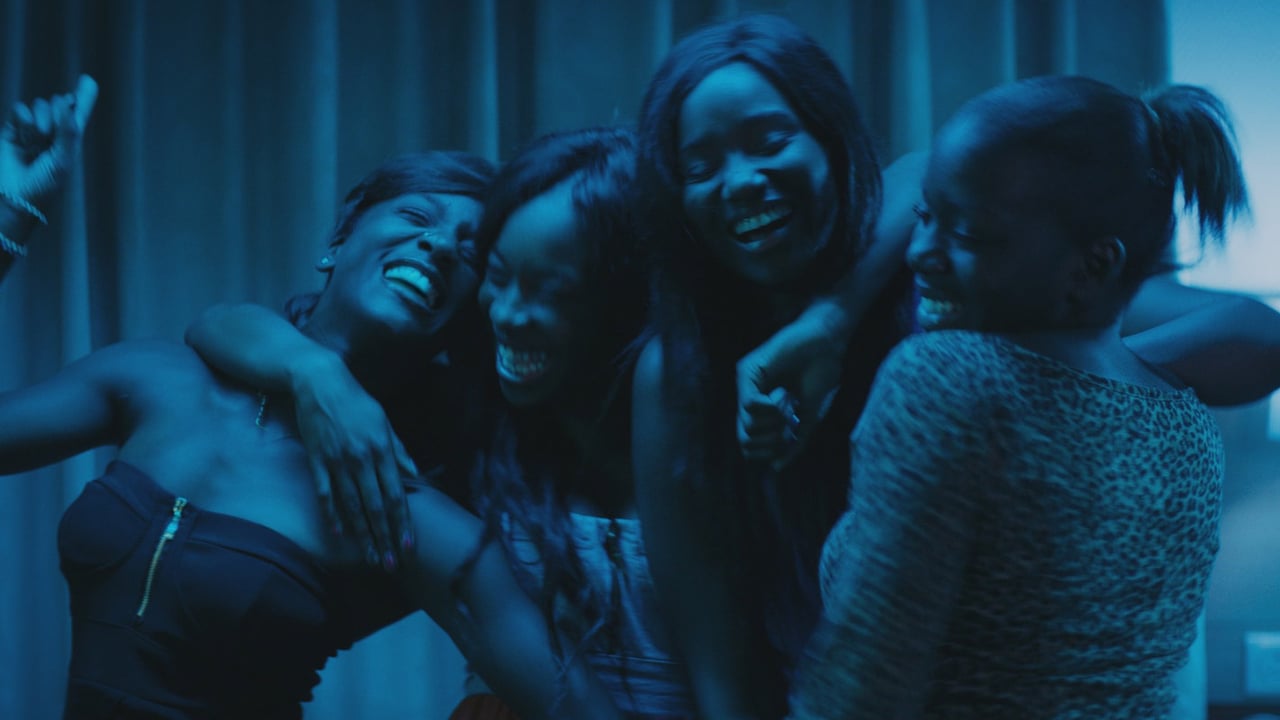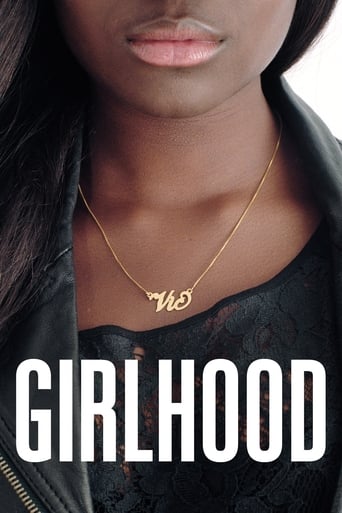

I gave this film a 9 out of 10, because it was exactly what I expected it to be.
... View MoreThe movie runs out of plot and jokes well before the end of a two-hour running time, long for a light comedy.
... View MoreThe movie turns out to be a little better than the average. Starting from a romantic formula often seen in the cinema, it ends in the most predictable (and somewhat bland) way.
... View MoreA movie that not only functions as a solid scarefest but a razor-sharp satire.
... View MoreAll-girl "gangs" may offer female teenagers a safe space to experiment with the trappings of womanhood - a step-up from childhood, but a transitional stage nonetheless. This social dynamic is explored in 'Girlhood', but against the backdrop of an impoverished, ethnic minority community in Paris, where every choice made has wider repercussions for life. Unfortunately, the film feels disjointed, in part because it doesn't seem to know whether it wants to celebrate this "girlhood", or look on aghast; of course real life isn't black and white, but the film seems to alternate between portraying these two extremes, instead of managing to paint a subtler shade. Beyond the fact that life's hard and people (and especially men) are hard as well, I didn't take too much away from this film.
... View MoreFrench director Céline Sciamma's new film is called "Girlhood," probably named that way in English to capitalize on last year's similar moniker, "Boyhood." But in French, it's translated as "Girl Gang," which to my ears is a more appropriate title. Citing the lack of French films dealing with black people, Sciamma, who is white, decided to hang out with some French-African teenagers to learn more about their culture and perhaps fashion a film based on her experiences. The resulting product features non-professional actors culled from what is usually referred to in the US as "the projects," rows of drab apartment buildings in a lower socio-economic section of the city.The opening scene is most telling as Sciamma depicts a group of high school girls playing American style football. As they walk home and continually pass by groups of loud, hostile-acting males, they gradually peel off, finally leaving us with the film's protagonist, Marieme, a 16 year old teenager who later refers to herself as "Vic" (for Victory).Marieme's mother is too busy working to pay much attention to the teenager's needs and her brother is a macho creep who occasionally physically abuses her. After she fails to get into college because of poor grades (and faced with the prospect of attending a vocational school instead), Marieme develops a crush on a boy who is friends with a gang of three girls—she soon falls in with the group and gradually is transformed from a shy teenager to an aggressive rebel.The leader of the three is Lady, whom the other girls look up to. Sciamma chronicles the misadventures of the girl gang as they traipse around Paris (mainly in shopping malls), shoplifting, extorting money from other girls and acting as obnoxiously as they can. Sciamma appears to take no stand on their behavior, merely depicting their loutish shenanigans as typical of wayward, rebellious teenagers. The main plot involves Lady's fall from grace after she is beaten up in a fight with a girl from a rival gang before a fairly large group of people. Lady retreats from public review after her father forbids her to pursue further rebelliousness activities. Marieme takes up the group's mantle when she in turn beats up the teenager who defeated Lady. Sciamma's gritty depiction of the activities of the girl gang and their rivals works well--akin to some of the more interesting cinema verité efforts here in the US. Not only does she capture their anti-social side with cogent verisimilitude but also highlights the teenagers' sense of camaraderie (the highlight being the group dancing to Rihanna's song "Diamaonds").Unfortunately, Sciamma's resolution to Marieme's story is not completely satisfactory. Marieme eventually parts with the rest of her group and begins working for a local drug dealer, Abou. At one point we see her disguising herself as a boy, perhaps to avoid being hit upon by rapacious males who are part of Abou's group. Later, Abou does just that at a party and Marieme declares she's through working for him. Marieme's boyfriend's suggestion that they get married falls on deaf ears and the aimless former gang leader is rebuffed after she tries to buzz herself into the family apartment.What are we supposed to conclude about Marieme's fate? Is she the victim of a society that favors the upper middle-class and the rich? Is it all racial—that because she's black, she can't get ahead? Or is it Marieme's own choices that stymie her? Perhaps she could have gone to vocational school instead of falling in with her girl gang rebels. Sciamma again perhaps takes no sides but her tale feels incomplete— perhaps we'll have to wait for the sequel to find out what happened to her.
... View MoreVery interesting movie that proposes a "soft" perspective on the downfall of Karidja Touré in the spiral of delinquency and social exclusion. I think it touched most of the elements that trigger such an attitude and certainly the main one being the quest for having a better life in combination to the indifference of parents overcompensated by an excessively violent brother trying to play the role of a father and a mother.The rejection of school and the lack of solution for children in situation of family and educational failure is also well presented.I'm not so sure why it was made easy for her to enter a group of girls but the fact that they become her second family with their specific codes (which is no codes) is actually well illustrated. I think the perspective of the director was to propose a softer version of what reality truly is, however, it does not take away from the brutality of certain scenes which does bring the spectator to react and question the choices of Karidja Touré.I did expect her situation to degrade very profoundly but the film stayed on the its staying soft while showing the reality of things.Certain characters did seem a little bit caricatural at times to my feeling and was often quite an understatement to the brutality that really exists within "gangs" in general (though I'm fully aware that this clique of girls were not really a gang -; hence the absence of the true codes that drive these kinds of criminal organizations). Some of the girls did get a little "photoshopping" especially Karidja Touré.The quality of the image is quite good and the movie stays really dynamic. The reinforcement of the absence of any parental authority is well done. Indeed, the mother is extremely absent in the majority of the scenes and even if she would be, she has very little to say to her oldest daughter and daughters in general.The story holds until the end and the development of the Touré character is well conducted.
... View MoreMy favourite film of 2014 being Boyhood, I was naturally curious to see 2014's Girlhood. Actually, Girlhood- which comes from France- isn't meant to be the feminine equivalent of Boyhood. It doesn't have the same scope and clearly wasn't filmed over 12 years. It deals with a teenage girl who, failing to graduate to high school, drops out of vocational school to join a gang. It's not as rough as you would expect for the first half of the film- what we have is an extended view of girls who like clothes, jewelry, singing Diamonds and even miniature golf. It's in the second half when we see a more serious fight (our protagonist, "Vic," uses a knife to remove another girl's bra) and then sex, and insults about being a slut. Instead of the gang being portrayed as a truly destructive force, it's actually more of a sisterhood whose members discourage Vic from descending deeper into criminality.We certainly see Vic's motivations for joining the gang- she has little future, and is told it's too late for her. Not encouraging. Her home life is rough, too. I can't say I was blown away by Girlhood, but it's a believable drama with a sympathetic protagonist.
... View More